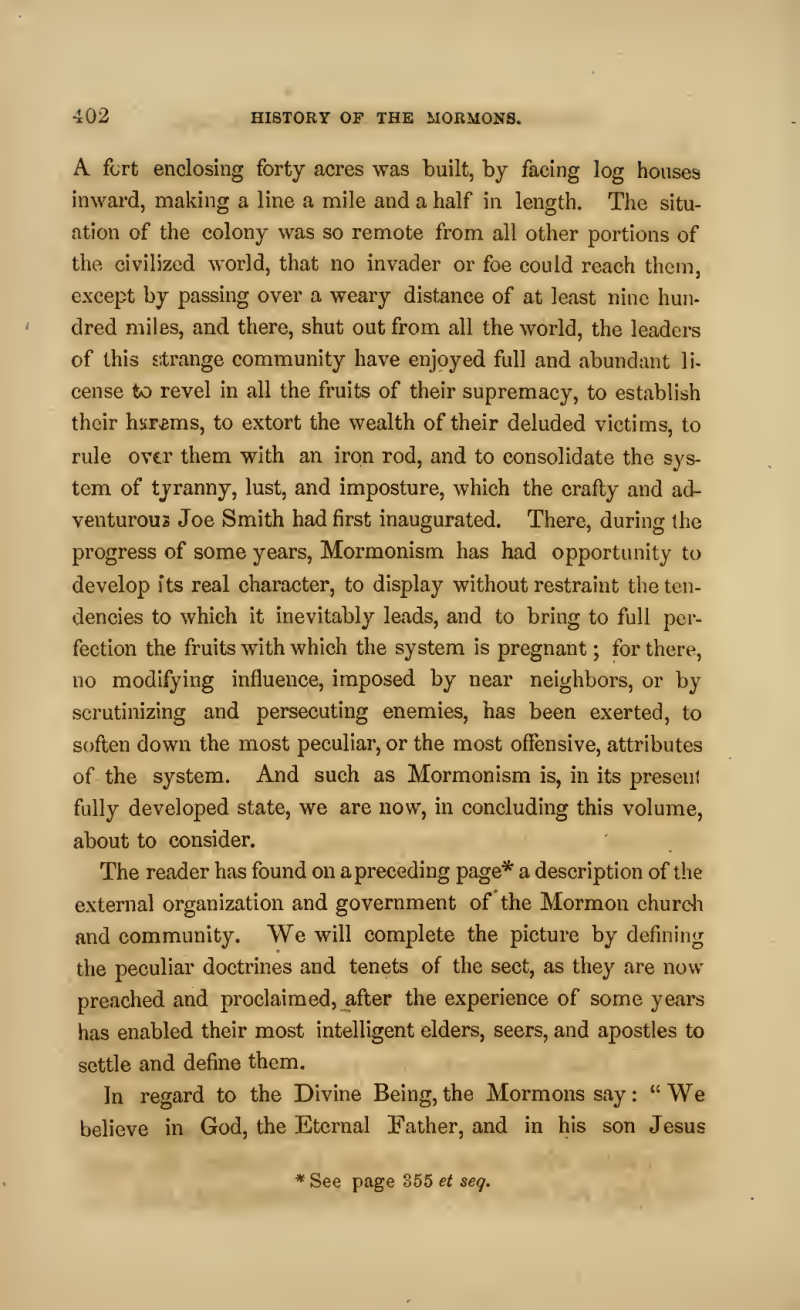Samuel Charles Mackay critiques the LDS "materialistic" conception of God; parallels this doctrine with the pagan god Jupiter.
- Type
- Book
- Source
- Samuel Charles Mackay CriticNon-LDS
- Hearsay
- Direct
- Reference
Samuel Charles Mackay, The Religious, Social, and Political History of the Mormons, or Latter-Day Saints, From their Origin to the Present Time: Containing Full Statements of Their Doctrines, Government and Condition, and Memoirs of their Founder, Joseph Smith (New York: C. M. Saxton, 1858), 402-4
- Scribe/Publisher
- C. M., Saxton, Barker, and Co.
- People
- Samuel Charles Mackay
- Audience
- Reading Public
- Transcription
In regard to the Divine Being, the Mormons say: “We believe in God, the Eternal Father, and in his son Jesus Christ, and in the Holy Ghost.” From this declaration the reader would reasonably infer that the Mormons entertained sentiments in regard to the Deity, similar in character to those which are held by other Christian communities; and sentiments both rational and intelligent in themselves. But never was there a greater error; for never was there a more absurd and monstrous conception than theirs entertained on the subject. One of their teachers: “We worship a God who hath both body and parts, who has eyes, mouth and ears, and who speaks when and to whom he pleases,--who is just as good at mechanical inventions as at any other business.” They teach that God possesses the person, the image, and the form of a man; that he has the same passions and impulses as a man; that he is in every respect only a superior grade of human being.
Consequently, the Mormon conception of the Deity is pure materialism; and in fact their whole system is materialistic throughout. They hold that not only is God material, but that Christ, the Holy Ghost, and the angels are all material personages. In reference to spirits alone, they teach that their bodies, though material, are not composed of flesh and bones, but of some unknown substance less tangible to our gross sense in the present life, but still tangible to those who inhabit the same sphere with themselves.
The Mormon conceptions of the nature of the three persons of the Trinity, are monstrous, absurd and blasphemous in the extreme. Holding as they do, that the Father, or first person in the Trinity, is simply a perfected man, whose intelligence and power may be termed infinite only in comparison with those of other beings, the consequences which are deducible and even deduced from such premises are equally monstrous. He has created everything by the exercise of power; but he begat the Son, of the Virgin Mary, after the ordinary fashion of human generation. The Eternal Father descended to the earth, wooed the fair virgin, won her to be his spouse, pro hac vice, and then consigned her over to the care of the compliant Joseph. From these secret but celestial interviews, the Savior of mankind was born; but we are not clearly informed whether the spirit which animated Christ, as well as his body, was the result of that intercourse, or whether it may have had a previous existence, which was afterward transferred to the body of the child, as its tabernacle in the flesh. And yet they strongly contend for the divinity of the second person of the Trinity, whose origin they thus explain.
In other words, the Mormon theology has revived again, in all its grossness, the old mythological conceptions in reference to the nature, passions and outrages of the now defunct Jupiter. Wherein does this statement of the conception of Christ differ from that of the old Grecian myth concerning Pollux and Jupiter? Jupiter, enamored of the charms of Leda, descends from Olympus, sails majestically through the clouds in the form of a swan, visits the object of his passion, and the two children are born. Or wherein does it differ from the origin of Perseus? Jupiter, again afflicted with the loveliness of Danae, descends in the shape of a golden shower, and the future destroyer of the Gorgon in due time is born. There is not the slightest difference between these gross and sensual conceptions of the character and actions of the ancient monarch of Olympus, as set forth by the voluptuous and imaginative Greeks, and the Mormon conception of the god of the Bible the infinite Father, as revealed in the purer and nobler revelation of the Scriptures.
- Citations in Mormonr Qnas
The B. H. Roberts Foundation is not owned by, operated by, or affiliated with the Church of Jesus Christ of Latter-day Saints.

